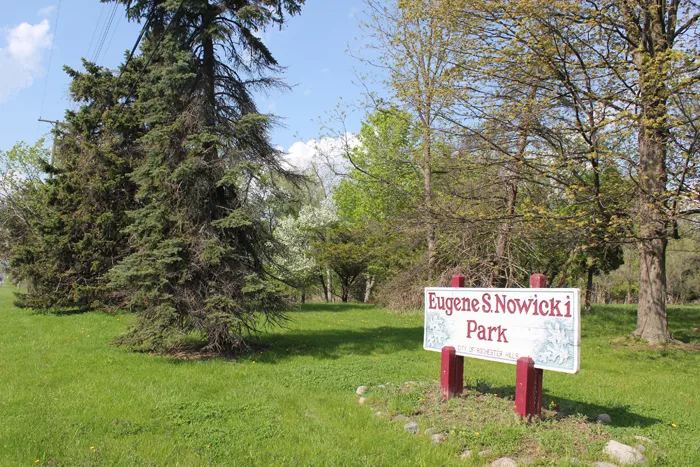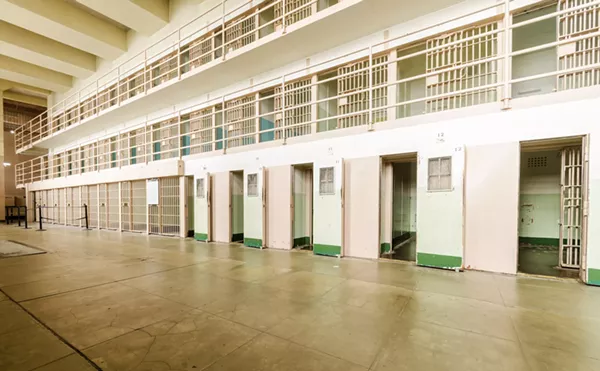Suburban oil drilling in Rochester Hills
Activist group sues city to halt potential oil, gas exploration.

Audio By Carbonatix
[
{
"name": "GPT - Leaderboard - Inline - Content",
"component": "35519556",
"insertPoint": "5th",
"startingPoint": "3",
"requiredCountToDisplay": "3",
"maxInsertions": 100,
"adList": [
{
"adPreset": "LeaderboardInline"
}
]
}
]

For years, the oil and gas business in Michigan has been contained to the northern portions of the state. But in recent years, exploration companies have expanded their footprint, drilling in new territory — in particular, southeast Michigan.
Nowhere has the industry gained more traction across the region than in Oakland County, where a number of public objections have been raised to potential drilling in suburban communities. But in reality, the county is no stranger to the oil landman: About 300 wells have been drilled in Oakland since 1927; the county has 21 active oil wells and nine active gas wells, according to the Michigan Department of Environmental Quality.
And due to the persistence of two Traverse City-based oil and gas exploration firms — Jordan Development Company and West Bay Exploration — the level of activity could soon increase. In recent years, Waterford Township, Springfield Township, Independence Township, and Rochester Hills have all leased the mineral rights of municipal-owned property to the companies for potential drilling. A similar offer from Jordan was shot down by the city of Rochester last year.
To city and township officials, the financial terms of the leases make sense: Jordan and West Bay have offered a $100- to $150-per-acre signing bonus. If the companies discover oil or gas, they would pay the community one-fifth to one-sixth of the net revenue from a future sale of resources. (Rates appear to vary across the state: In March, MLive reported a company buying mineral rights in Genesee County offered private landowners $35 per acre, plus one-sixth of royalties.)
In Rochester Hills’ case, the city’s five-year lease would generate just $9,000 for its coffers upfront.
But some residents vehemently opposed to the city’s deal have cried foul. Earlier this month, a grass-roots group called Don’t Drill the Hills filed a lawsuit against the city and Jordan to halt potential drilling under two city parks and a city-owned cemetery.
Some background: Jordan first approached Rochester Hills about a potential lease in late 2012. The company was interested in city-owned Tienken Park, Nowicki Park, and VanHoosen Jones Creek Cemetery, according to the complaint. In December of that year, Rochester Hills City Council approved a lease, granting Jordan the rights to explore for, extract, and sell any oil underneath those properties, the complaint said. The city’s mayor, Bryan Barnett, signed the lease the following month.
The lawsuit, filed in Oakland County Circuit Court, contends a voter-approved charter amendment in 2011 blocks Rochester Hills from leasing, selling, or converting city-owned parks to other uses — unless voters approve the changes.
The legal challenge was the next “logical step,” says Gail Hammill of Don’t Drill the Hills. “We had the charter amendment in 2011 that we voted on that said you couldn’t lease the parks. And suddenly they’ve leased the parks without a vote, without notification, without anything … and in the dead of December.”
Suburban drilling in neighborhoods and parks has generated headlines nationwide, especially at a time when hydraulic fracturing — a mining method commonly known as “fracking” that involves injecting water, chemicals, and sand into shale rock, creating cracks that force gas or oil up — has been a boon to the industry over the last decade.
Advocates say fears of the dreaded F-bomb are completely overblown, but Don’t Drill the Hills says Jordan’s lease provides a loophole to extract oil and gas as they deem fit, a concern when reports have shown sloppy fracking has caused groundwater contamination. According to The Christian Science Monitor, a study last year found wastewater from fracking, as well as other forms of gas and oil extraction, from a western Pennsylvania treatment facility contained contaminants even after being treated.
Nevertheless, Jordan has pursued mineral rights leases with private homeowners. And the company has maintained to city officials and landowners that neither high-volume nor low-volume fracking would be used in Rochester Hills, said city attorney John Staran.
Jordan insists there’d be “no disruption to the city’s use of those properties as parks … that there’d be absolutely no drilling activities [on-site] and there’d be absolutely no fracking going on in the city,” Staran tells Metro Times.
The company would use a method known as horizontal drilling, Staran explains. The way it would work: a wellhead would be located as far as two miles from the oil or gas. Then, as officials put it, the structure would travel horizontally underground to the resources, out of residents’ sight.
“We wouldn’t even know if they were there,” Staran says.
The production facility would be situated farther out from the resources, officials have said. But, for now, it’s unclear where the wellheads or processing sites would be located. To date, Jordan hasn’t begun drilling in Rochester Hills.
Nevertheless, says Hammill, her group has researched other suburban drilling sites in Pennsylvania, Colorado, and Ohio. She says it’s possible that trucks transporting resources to production facilities might have leaks, and the drill sites could pose a health risk.
Nic Clark, Michigan director of Clean Water Action, a national environmental protection agency, says Hammill’s concerns are reasonable. “Average people have realized … these cast wells smell a lot of times … that’s one of the biggest impacts.”
To Hammill, it’s not just about the potential worst-case scenario in the community of 72,000. She says residents are drawn to Rochester Hills because of the city’s sprawling parks system, rock-solid school system, and quiet community. The idea of oil and gas exploration companies coming into their town — even with the potential revenue on the table — and perhaps disrupting that serene environment simply unnerves some.
Clark says the “fortunate byproduct” of Jordan’s efforts in Oakland County has been an “increased awareness … on public health impacts that are posed.”
“There’s a lot of misinformation out there and a lot of confusion,” he says. “One of the things that residents are seeking in these communities are the facts, and wanting to know what these operations really look like for their community.
“Ultimately, they want to have a say in the process.”
Clay Carpenter, program officer for Clean Water Action in Oakland County, says Rochester Hills residents are most concerned by the concept of “compulsory pooling,” which, in essence, allows Jordan to explore under a property even if a homeowner is against drilling. As ProPublica reported, compulsory pooling “compels holdout landowners to join gas-leasing agreements with their neighbors. The specific provisions of the laws vary from state to state, but drillers are generally allowed to extract minerals from a large area or ‘pool’ … if leases have been negotiated for a certain percentage of that land.”
When you consider the terms of the leases for a private homeowner — $100 to $150 per acre signing bonus, a fraction of royalties if oil or gas is found — the question then becomes: Is the risk worth the reward?
It’s not as if Rochester Hills is desperate for jobs and revenue: The average value of a home in the community is north of $245,000, its average median household income is $72,000, its unemployment rate hovers around 5 percent, and, time and time again, the city garners recognition for financial management.
So what gives?
Rochester Hills Mayor Bryan Barnett told WXYZ Channel 7 earlier this month before a town hall meeting on the oil and gas leases that, in many instances, “the city can write an ordinance and control something or regulate it. Here, with gas and oil, it’s clear cities don’t have the authority. … When something is out of our wheelhouse, we have to work with the authorities that have the power and control.”
What he was likely referencing is Jordan’s ability to pursue leases with private landowners — that if Jordan lines up enough support in a local subdivision, the company may drill regardless of the city’s approval.
So if Jordan is going to drill in Rochester Hills anyway, it might be best for the city to get on board and work with state officials to ensure the best practices are used. The state requires Jordan and other firms to have a 40-acre parcel in order to receive a permit to drill.
Barnett’s office declined comment to Metro Times, citing pending litigation. Ben Brower, the vice president of Jordan, says he has “no comment at this time.”
Don’t Drill the Hills’ complaint asks the court to void the city’s drilling lease, and find that it violates Rochester Hills’ charter and Michigan’s Home Rule City Act for the transfer of the mineral rights of the city-owned land to Jordan.
“We aren’t trying to stop the drilling in Michigan,” Hammill says. “We’re saying please go drill where there are not schools, not homes, where there are kids [playing].”






